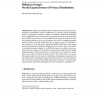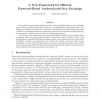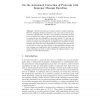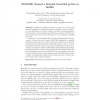1777 search results - page 102 / 356 » Programming Cryptographic Protocols |
122
click to vote
SEC
2008
15 years 3 months ago
2008
Many applications inherently disclose information because perfect privacy protection is prohibitively expensive. RFID tags, for example, cannot be equipped with the cryptographic p...
116
Voted
CCS
2010
ACM
15 years 2 months ago
2010
ACM
Protocols for password-based authenticated key exchange (PAKE) allow two users who share only a short, low-entropy password to agree on a cryptographically strong session key. The...
163
click to vote
IFIP
2009
Springer
14 years 12 months ago
2009
Springer
Security protocols are crucial to achieve trusted computing. However, designing security protocols is not easy and so security protocols are typically faulty and have to be repaire...
105
click to vote
SIGSOFT
2000
ACM
15 years 6 months ago
2000
ACM
Fuzzing is a well-known black-box approach to the security testing of applications. Fuzzing has many advantages in terms of simplicity and effectiveness over more complex, expensi...
119
click to vote
ACNS
2009
Springer
15 years 8 months ago
2009
Springer
Abstract. Two-party Secure Function Evaluation (SFE) is a very useful cryptographic tool which allows two parties to evaluate a function known to both parties on their private (sec...




